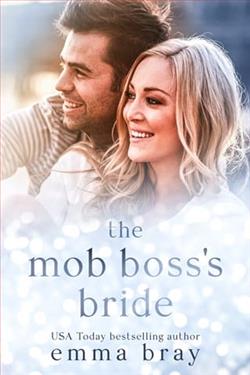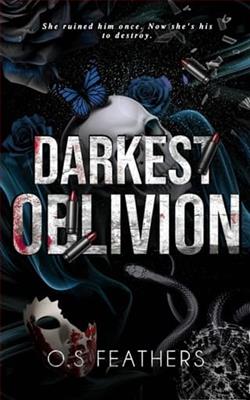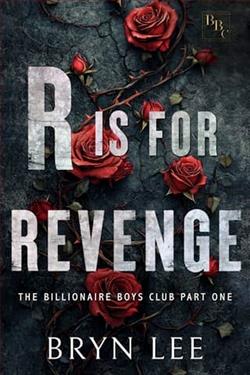Page 89 of A Treacherous Trade
“What do you mean?” I asked. “She was not poisoned?”
“On the contrary. She almost certainly was.” He patted his vest pockets for his spectacles, and not finding them, held the clipboard farther away from his face as he flipped through hastily scrawled notes. “Tell me, do either of you know if the victim had a history of thrombosis?”
“Of what?” I looked up from her eerily still features, as still as that photograph on Hartigan’s wall. She looked nothing like the girl in the portrait. Animated and lively, young and deceptively innocent.
I’d have not recognized her like this. Hair and features frozen and discolored. Eyes pressed closed by weights.
“Oh, right.” Phillips gave a self-effacing chuckle. “You’re aware that when we’re wounded, our blood builds up a scab over the skin to protect and heal it from the inside out. Well, sometimes when a wound is only internal, the blood will attempt to do the same out of confusion and clot in our veins. This clot, a thrombosis, will often dissolve on its own, but if it moves to the lungs, or the heart, or—God forbid—the brain, it’s generally quite lethal.”
“You think one of these… thrombosis killed her?” I queried.
“Actually, the opposite. Her blood was like water. Thinner, if you’d believe it. I’ve never seen anything like it. It’s why she bled from her orifices. However, I did not find sufficient internal hemorrhaging to kill her, and her stomach had been almost petrified by a corrosive agent. Just not one I have identified as of yet. Some chemicals are difficult to test for when diluted in the blood or the stomach contents. Also, there are deadly agents that can be absorbed through the skin, or breathed in through the lungs, that could kill. It’s such a mystery.”
I shuddered, doing my best to forget that the world was such a toxin-rich environment. “So, you think two different substances were responsible for how she was found. Any idea what might have thinned her blood to such a degree?”
He shrugged. “New medicines are always making such claims, but we’ve not produced a tried-and-true thrombogenic anticoagulant as of yet.”
“Then how are these blood clots treated?” I asked.
“Most often with rest and prayer.” He grimaced. “Some physicians will prescribe silicates, but that wouldn’t have caused Miss Sheffield’s issue.”
“That’s unsettling,” Croft, who’d been patient and quiet, muttered out of the side of his mouth. “With so much that can go amiss, how can you be certain to treat any condition with certainty?”
Phillips snorted, clapping Croft on the shoulder. “I’ve always said madness is a lack of doubt, my boy. Nothing is certain, and everything deserves a second opinion. We doctors are experts atnotknowing, though few will tell you so.”
“Comforting,” the inspector griped under his breath.
I smothered a smile, though Phillips seemed not to have heard Croft’s sarcasm.
“There are plants that are said to have anticoagulant properties,” he continued. “But they’ve not been proven in any clinical demonstrations and therefore are the domain of those women I like to call kitchen witches.”
“Kitchen witches?” I echoed.
“Midwives, neighborhood healers, herbalists both of ethnic tradition and self-taught, or worse, religious deniers of the scientific method and scholarship as a whole. They often dispense these remedies to either miraculous or more often disastrous effect. It all depends on variables out of their control.”
“Same could be said for your lot,” Croft pointed out, bringing to mind the veritable dispensary of herbs in his own kitchen. “And there are too many who can’t afford a doctor’s care that have nowhere else to go but to the neighborhood healer.”
“Just so.” Phillips regarded the large inspector with a speculation I couldn’t identify. One that almost seemed approving. “Medicine is a practice, not a promise. We are learning new things all the time, and some of those lessons are hard. Such as when we find standard practice is actually more harmful than healing.”
Female herbalists,I considered. Like Aramis Night Horse’s mother. Like Amelia with her teas and poultices, and even Indira with her exotic spices used for both food and remedies. “Women used to be burned for the skill they had with herbs,” I remarked. “Maybe because they healed the wrong people, or didn’t poison the right ones.”
“I’m the first to admit that medicine is often made from such herbal remedies. Distilled down or extracted in a lab. So many illnesses can be treated or cured with something as simple as mint, pepper, or ginger—however, I take issue with the untrained treating the sick. It’s dangerous, and I see the effects in this office too often.”
Phillips pulled the sheet back up over Jane’s head, and Croft helped him to slide the heavy slab back into the drawer.
Though I’d become somewhat inured to death, I had to hide a part of me that was distraught at the sight of Jane disappearing. Of her being trapped in that cupboard alone in the dark. The next time she was released, she’d be put in the ground, haphazardly tossed onto a pile of unwanted bodies in a field to the north and dissolved with lye. Her name not marked with a stone, but on records somewhere in a dusty storeroom.
Her lovers—her customers—would move on to some other warm, willing girl, losing themselves in supplementary pleasures.
Who would miss her? Who else would remember?
“What was she to you?” Phillips was suddenly at my side, looking down at me as if sensing the maudlin direction of my thoughts.
“Where’s Croft?” I asked.
“Popped to the loo whilst you were staring at the drawer like you might bring the girl back from the dead.”
“Lost in thought,” I said by way of explanation. “I didn’t hear him leave.”















